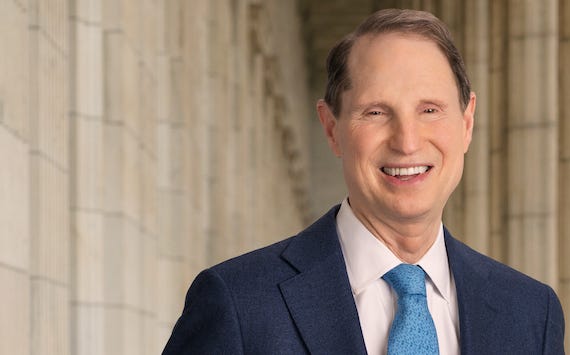Wyden consultant brokered FTX executive's $500,000 donation to Oregon Democrats
Senate Finance Chair Ron Wyden's paid fundraising consultant -- "all things Ron Wyden" -- arranged the details of a record-breaking donation under scrutiny by the Oregon Department of Justice.

Oregon’s senior U.S. Senator and Finance Committee Chairman Ron Wyden was the middleman in a $500,000 donation from an admitted campaign finance fraudster to the Democratic Party of Oregon that threatens to tear the lid off state politics, according to an email to Wyden’s fundraising consultant days before the fateful donation.
Wyden’s role brokering the donation comes after he received campaign donations over the course of more than a decade from the family behind the spectacular, and allegedly fraud-fueled, failure of cryptocurrency firm FTX.
The Oregon Roundup obtained the email disclosing, for the first time, Wyden’s role in the donation, via public records request from the Oregon Office of Administrative Hearings:
The subject of the email was getting $500,000 from cryptocurrency firm FTX, then just 43 days from bankruptcy and Bernie Madoff-scale infamy, or someone associated with FTX, to the Democratic Party of Oregon for its “coordinated campaign” in support of Democrat Tina Kotek’s then-teetering candidacy for Oregon governor.
The federal government believes then-FTX CEO Sam Bankman-Fried and its then-Chief Engineer Nishad Singh unlawfully funneled funds from FTX to federal and state campaigns throughout the country. U.S. DOJ has charged Bankman-Fried on campaign finance fraud; Singh has pleaded guilty to similar charges and is believed to be cooperating with the DOJ in its case against Bankman-Fried.
“Diana is all things Ron Wyden” suggests Wyden, not the DPO or Kotek, may have provided the crucial influence conduit through which DPO received its largest-ever donation from an employee of a company with little to gain or lose from the outcome of Oregon’s gubernatorial election. Before peeling that onion further, let’s provide the necessary context.
“Diana” is Diana Rogalle, the Washington, D.C.-based fundraising consultant who owns The Ashmead Group, which counts Wyden and Oregon’s other U.S. Senator, Democrat Jeff Merkley, as clients. The Wyden campaign has paid The Ashmead Group between $6,000 and $9,000 per month for its fundraising services for years, including in the fall of 2022, according to federal campaign finance records.
Susan McCue is a DC-based political consultant who counted FTX as a client, according to the company’s bankruptcy filings.
“Mark” is Mark Wetjen, who in the fall of 2022 was the head of policy and regulatory strategy for FTX. Before FTX, Wetjen served as a Commissioner of the Commodity Futures Trading Commission under President Obama. The CFTC comes perhaps comes closest among federal agencies to possessing the ability to regulate the largely unregulated cryptocurrency industry. A current CFTC Commissioner in January laid blame for FTX’s catastrophic meltdown at the feet of “former government lawyers” like Wetjen who had cashed in as employees of the company but failed to help it avert disaster.
In a subsequent email, Rogalle enlisted the help of two additional Wyden aides to gather details Singh needed in order to wire the donation.
Jocelyn Tyree is compliance director for Wyden for Senate. Tim Leahy is Wyden for Senate’s campaign manager, as well as outreach director for Wyden’s Senate office. Amelia Manlove, is the compliance director for the DPO.
Singh wired $500,000 to the DPO on October 4. The DPO incorrectly reported the source of the donation to be Prime Trust LLC, which acted more or less as the bank holding then wiring Singh’s funds on his behalf and at his request. After The Oregonian started snooping around about the donation, Singh formally informed the DPO he was the source of the donation, and the DPO amended its filing.
The DPO’s amendment, submitted less than a week before the November election, was filed late. The Oregon Secretary of State initiated an investigation into potential criminal conduct by Singh and the DPO, and proposed a $35,000 civil fine against the DPO. The DPO appealed, and the Secretary of State agreed to slash the fine by 2/3 and ditch its criminal probe. The Oregon Department of Justice, DPO ally Attorney General Ellen Rosenblum having recused herself from the matter, says it is determining whether to take up the criminal investigation into the DPO.
Wyden did not receive a dime of the Singh donation, but his involvement in it is likely the key to understanding why FTX chose to make a huge play in Oregon’s governor race. A few months ago, I reported that Wyden has long been a recipient of Bankman-Fried family donations.
Way back in 2010, Joseph Bankman, Sam Bankman-Fried’s father and Stanford Law School professor gave Wyden’s campaign $2,500, then the maximum allowed to congressional candidate campaigns. At the time, that was by far the largest donation Bankman, long before FTX even existed and the Bankman-Fried family’s political donations became international news, had reported making to a federal campaign, according to federal campaign finance records. Bankman is a subject of the same federal criminal probe that led to the charges pending against Sam.
Gabe Bankman-Fried, Sam’s brother and the subject of the same federal investigation, gave Wyden for Senate $2,900 in April 2022. Sam himself donated $2,900 to Wyden’s campaign on October 26, 2022. The same day, Sam gave $7,100 to the Democratic Party of Oregon’s federal PAC and $10,000 to the Oregon Victory Fund, another federal PAC that helps fund Democrats.
All that money went to the same physical location. Wyden for Senate, the Oregon Victory Fund and the state and federal Democratic Party of Oregon PACs share the same address in downtown Portland: 1220 SW Morrison St., Suite 910. Wyden for Senate pays rent to the DPO.
FTX, now under the control of a federal bankruptcy trustee who is trying to recover funds owed to the company’s creditors, asked candidates who received donations made “by or at the direction of . . . Bankman-Fried” to return them to help the company pay its allegedly defrauded creditors.
As of March 31, the end of the most recent reporting period, Wyden had not, apparently, returned the donations of Gabe or Sam Bankman-Fried. Most of the 59 candidates who received personal donations from Bankman-Fried told NBC News earlier this year they would donate or return the donations. NBC, which contacted all recipients of Bankman-Fried contributions, did not mention Wyden in its story. Thirty-one of the campaigns did not respond to NBC’s inquiry.
Democrats’ Senate Majority PAC, the Democratic Senatorial Campaign Committee and the Democratic Congressional Campaign Committee have each said they would return or donate to charity contributions received from Bankman-Fried and Singh.
Back in March, I contacted Wyden’s office seeking comment on the status of the Bankman-Fried donations and whether the campaign would return the funds to FTX creditors or donate it. I heard nothing back.
Wyden’s longtime connection to the Bankman clan and close physical and political proximity to the DPO may have provided the opportunity to ask for $500,000 for the hotly contested Oregon governor race. Wyden’s position as Finance Committee Chair likely made the investment seem a good one for FTX.
In March 2022, not long before the Gabe Bankman-Fried donation commenced a new round of family giving to Wyden, the Finance Committee chair rather surprisingly became the Democratic champion for the cryptocurrency industry. The industry could hardly have a more well-placed ally on Capitol Hill than Wyden. The Finance Committee would be at the center of any congressional efforts to regulate the nascent industry.
The Financial Times reported, ominously in retrospect, that Wyden “urged members of his party to protect crypto innovators despite concerns about fraud and money laundering within the industry.”
Now, we do not know exactly what transpired before the September 29 “all things Ron Wyden” email. McCue wrote that she had talked to Rogalle and Wetjen about each other. Rogalle was “following up directly w[ith] principles,” without identifying who those principles were (someone at DPO, Singh, Bankman-Fried or Wyden seem the most likely suspects).
I think there are two plausible explanations for how the September 29 email, and later the donation, came to be, based upon what we know now. Option one: McCue took an interest in the Oregon governor race and unilaterally sought to connect her client FTX, which had an interest in funding Democratic campaigns across the country, with her friend Rogalle, who happened to have a client who represents Oregon in Congress.
Option two: Rogalle or Wyden himself asked McCue or someone in the FTX hierarchy who later communicated with McCue about a possible FTX donation to help with the Oregon governor race. By the time of the September 29 email, “the $500k to OR coordinated campaign” was a thing apparently known to all three parties to the email.
Or maybe there’s an option three I’m not considering. To me, the fact of Wyden’s previous donation from Joseph Bankman and the emphasis on Rogalle being “all things Ron Wyden,” without any reference to the DPO, suggests everyone knew why a Wyden fundraiser, not a DPO fundraiser, was involved.
If Option two is what happened, and if the Senate Finance Committee chairman and cryptocurrency champion comes asking for a cool half-million-dollars for something important to him in his home state, you don’t say no. Especially if you’re FTX. And we’d know nothing about Wyden’s involvement in the donation but for the DPO misreporting the source of the donation and appealing a $35,000 fine, a decision that appears a very bad one, now.
Wyden, probably the most powerful member of Congress on cryptocurrency issues and an acknowledged champion of the industry, helped, at the very least via his paid fundraising contractor, steered to the DPO a $500,000 donation that dwarfed the maximum Singh or any other FTX executive could have lawfully made directly to Wyden’s congressional campaign.
Wyden received $5,800 in donations from Sam and Gabe Bankman-Fried shortly before FTX declared bankruptcy, and appears not to have returned or donated those funds despite the request of FTX creditors.
Wyden’s receipt of a campaign donation in 2010 from Joseph Bankman, then a campaign funding neophyte, suggests a longstanding relationship of at least a campaign donation variety with the family that shook cryptocurrency and other financial markets to their core and spurred a far-reaching federal campaign finance fraud probe.
Diana Rogalle, “all things Ron Wyden,” facilitated the $500,000 donation while being paid by Wyden for fundraising services. Neither Rogalle nor her company have ever been paid by the DPO, according to state campaign finance filings. Yet, neither the Wyden campaign nor Rogalle reported an in-kind contribution to DPO in an amount equivalent to the value of her professional fundraising services, as is required under Oregon law.
Irregularities abound. Wyden continues to chair the Senate Finance Committee, with jurisdiction over what remains of the cryptocurrency industry, free from publicly reported inquiry by state or federal authorities related to his role in brokering the DPO donation.






To run crypto, you need big computer chips. And guess who's making bank on that angle. https://www.bojack2.com/2023/05/mrs-wydens-wall-street-juggernaut.html
and it all started with the "Gray Panthers". sounded pretty noble at the time. :o(